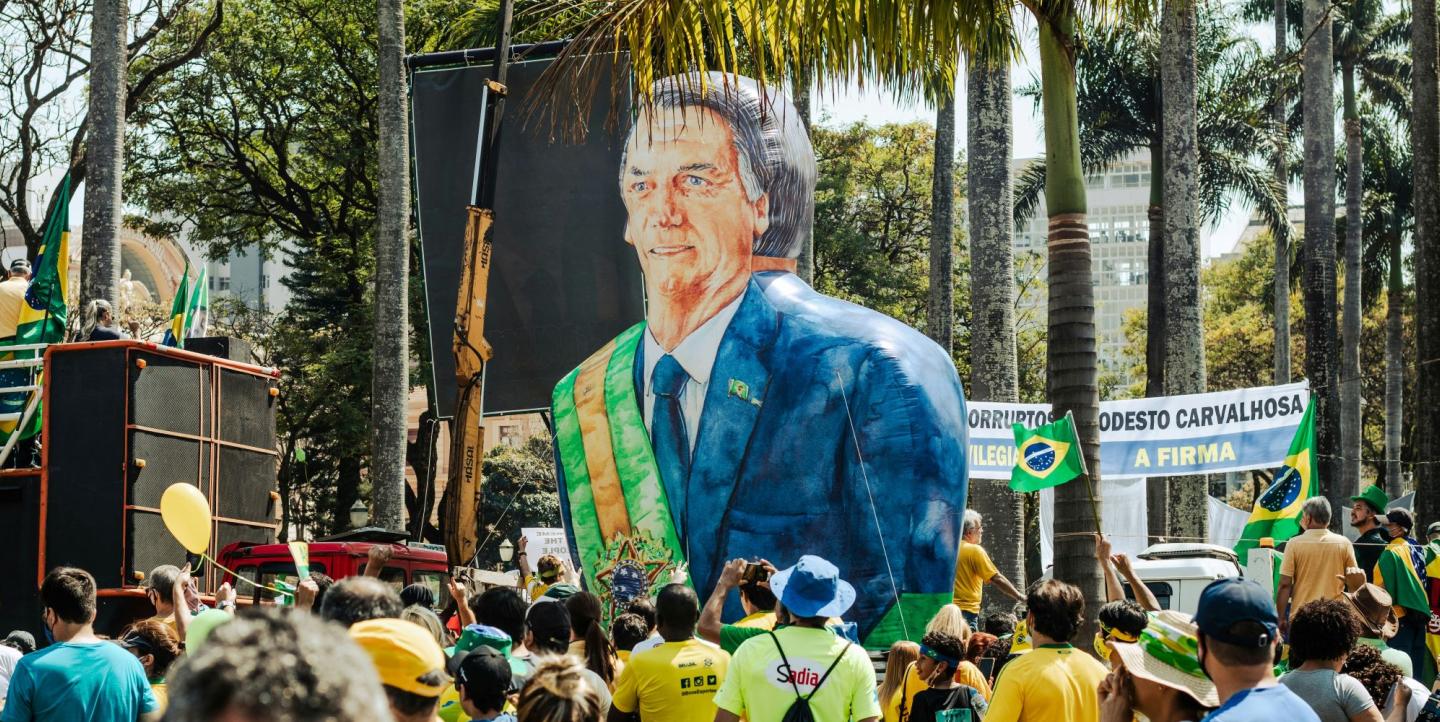In the wake of alarming revelations that members of the Brazilian military allegedly planned a coup to overturn the country’s 2022 election, as well as an assassination attempt on the lives of President Luiz Inácio Lula da Silva, his vice president, and a Supreme Court judge — and that former President Jair Bolsonaro was aware and possibly involved with the plan — Brazil is grappling with what comes next.
The mainstream media, in Brazil long considered a pillar of democracy, is under renewed scrutiny for amplifying radical narratives and failing to critically examine anti-democratic rhetoric. To attract audiences, many Brazilian outlets have turned to misleading or sensationalist clickbait headlines which at times have also promoted hate speech by actors on the far right, leading to fears that the press is normalizing the harmful discourse.
Understanding how mainstream media has contributed to these dynamics is essential for assessing its responsibility to chart a path toward greater accountability.
Platforming extremism
During Bolsonaro’s presidency from 2018 to 2022, media coverage promoted “false balance,” explained journalist and co-founder of The Intercept Brazil, Cecilia Olliveira. “The Brazilian press treated radical figures and movements as legitimate parts of the political debate, without proper context about their anti-democratic implications,” she said, adding that it’s a pattern that continues today.
Olliveira specifically pointed to how outlets have practiced “declaratory journalism,” in which inflammatory statements made by Bolsonaro and others on the far right were simply reported as is, without critical analysis or fact checking. “[Declaratory journalism] became a free platform for disinformation and attacks on democratic institutions, including the press itself,” she said.
Marcelo Soares, professor and editor of the Brazilian data journalism studio, Lagom Data, echoed the critique. “The so-called ‘serious’ press has continued to make declaratory statements more and more often. It's easy to produce and always gets a lot of clicks and shares, depending on the size of the absurdity,” he said.
This trend is not unique to Brazil, said journalist and researcher Luciana Moherdaui, who covers the far right. “International scholars like Jay Rosen and Jeff Jarvis have criticized the logic of giving equal space to extremists, to publish the other side. The Brazilian media fell into this trap, failing to adapt to the dynamics of viral misinformation,” she said. “The press struggled to fact-check real-time disinformation during Bolsonaro’s campaign and presidency, leading to an erosion of trust in journalism.”
Platforms like WhatsApp, meanwhile, have given far right figures a direct line to the public, bypassing traditional media gatekeepers, said Soares. “In 2015 and 2016, I noticed the ‘spontaneous’ mobilization around Bolsonaro on social media. Platforms amplified his presence, while traditional media failed to provide critical context,” he explained.
The media’s failure in this area has been compounded by attacks on journalists and media outlets. The Bolsonaro administration systematically undermined journalists and newsrooms’ credibility, branding them as biased or corrupt. “This rhetoric has emboldened extremists to target journalists, further weakening the press’s ability to hold power accountable,” said Olliveira.
From crisis to accountability
While the press has begun to scrutinize the far right more rigorously after the January 8, 2022, coup attempt, experts agree that deeper structural changes are needed. Olliveira called for a shift toward investigative reporting that exposes the extent of the consequences of far right policies. “The media must prioritize contextualized analysis over the mere reproduction of statements. This will require resisting commercial pressures to chase sensationalist narratives,” she argued.
As many far right figures intentionally try to get their extreme rhetoric picked up in news coverage, Moherdaui stressed the need for Brazilian outlets to rethink their editorial strategies to avoid platforming extremists in exchange for views. “Journalism needs to review its production processes, as its content is widely distorted in order to go viral,” said Moherdaui. [This gives] space to science and democracy deniers, to those who preach against vaccines and against the electoral process. This content is used as a strategy to destroy democracy and established systems.”
Soares pointed to the rise of independent journalism in Brazil as a promising counterbalance to the limitations of legacy outlets. “Smaller, independent outlets often produce the kind of investigative journalism that large corporations have deprioritized,” he said. These initiatives, though still niche, provide a roadmap for revitalizing the media’s crucial role in a democracy.
Learning from global lessons
The U.S. experience with Trumpism offers parallels and cautionary tales for Brazilian media. It presents an opportunity, too, for Brazilian journalists to adopt practices that have worked for colleagues in the U.S., while tailoring them to the local context, said Olliveira.
“Quality journalism must prevail over the easy appeal of sensationalism, reaffirming its commitment to the truth and the public interest. This requires courage and a willingness to challenge power structures, even at the risk of losing access or facing backlash,” she said.
For the media to change they have to first acknowledge that they are contributing to the problem, said Soares: “If the company's main objective is to attract high volumes of clicks to show to advertisers, despite the quality, and the bosses consider that the most viable way to achieve this objective is to produce ‘declarations’ on an industrial scale, nobody is going to convince the companies to do anything different.”
By rejecting sensationalism and embracing accountability, Brazil’s media can reclaim its role as a bulwark against authoritarianism. In a time of profound political and social upheaval, the press must choose whether to perpetuate the status quo or become a force for democratic renewal.
Photo by Matheus Câmara da Silva on Unsplash.


